《英汉翻译简明教程》学习辅导书(课文-演 讲)【圣才出品】
英汉互译简明教程(第二版)课件3 第一篇 主语显著和话题显著

翻译中的转换
C-E:汉语“话题-评论”结构转为 英语“主谓结构”
例1:凡是已经发现的错误,我们都已经采取了或正在采 取纠正的步骤。没有发现的,已经发现,我们就准备纠 正。
译汉文语的2:话W题it常h由re“ga对rd于to…a来ll说th”e m,i“sta关ke于s…h”av,ing“b至een d于is…co”v,ere“d涉, s及tep…s”h,av“e b要e说en到ta…k”en等o引r a出re。b英ein语g中ta也ke有n to c相or应re的ct引. A导s f词or语th,o如seansofotry, eats dfairscaos,vbeerecdon, ctherenyewd,iwll ibthe croegrarerdctteod, inasthseoocanseasoft,h汉ey译c英om时e当to然li可gh以t. 使用英语中这
Lead-in
• 造成中英译文差异的原因是,中文和英文语 言结构方面的不同。
• 英文主语显著,而中文具有话题性。
主语显著和话题显著
什么是主语显著?
• 主语显著(subject-prominent)指的是这样一种语言, 即主语和谓语是句子结构的最基本语法单位,而且 句子一般都有主谓两成分。英语就属于主语显著的 语言…(a language in which the grammatical units of SUBJECT and PREDICATE are basic to the structure of sentences and in which sentences usually have subject-predicate structure. English is a SubjectProminent language…)
英汉互译简明教程TranslationTechniques-2023年学习资料

Choice of Word Meaning-In the practice of translation what perplexes us most-frequently is how to find an e uivalent in the language to-be translated into.Great are is called for in the-translation of "familiar"Eng ish into Chinese,as their-meaning vary with the chang in collocation or context.-By diction,generally spea ing,the following are some-commonly-used ways availab e to find an equivalent in-the TL.
Word Meanings-Conceptual Meaning:is the basic meaning and-the main information carried by linguistic signs. e.g.No smoking禁止吸烟-Stylistic Meaning:is communicated f the social-circumstance of language use.
Linguistic Meaning:is built on the relationships of-t e signs with each other in the same system.-e.g.-千山鸟飞 ,From hill to hill no bird in fight.-万径人踪灭。From path o path no man in sight..-■-Pragmatic Meaning:is the s udy of the "relation of-signs to interpreters".-大家见面, 呼声“吃了吗?”透着和气。-They greet with each other with a "Hi"j st to show their-good neighbourly feelings.-年夜饭-famil reunion meal on the eve of the Spring Festival
郭著章、李庆生《英汉互译实用教程》(第3版)课后习题及详解-第10、11章【圣才出品】
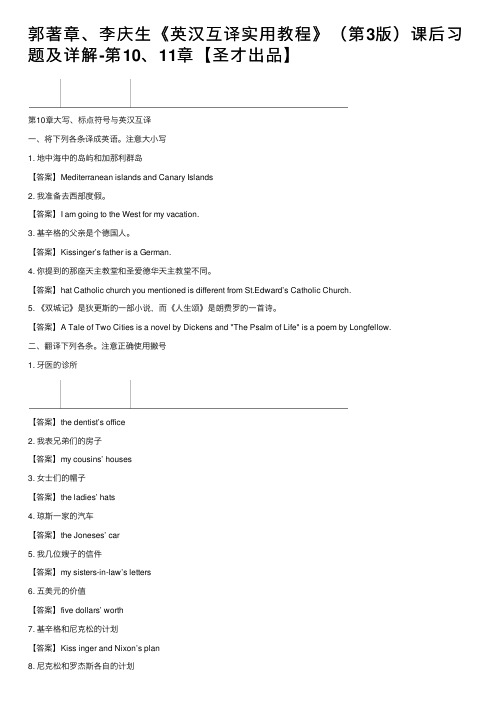
郭著章、李庆⽣《英汉互译实⽤教程》(第3版)课后习题及详解-第10、11章【圣才出品】第10章⼤写、标点符号与英汉互译⼀、将下列各条译成英语。
注意⼤⼩写1. 地中海中的岛屿和加那利群岛【答案】Mediterranean islands and Canary Islands2. 我准备去西部度假。
【答案】I am going to the West for my vacation.3. 基⾟格的⽗亲是个德国⼈。
【答案】Kissinger’s father is a German.4. 你提到的那座天主教堂和圣爱德华天主教堂不同。
【答案】hat Catholic church you mentioned is different from St.Edward’s Catholic Church.5. 《双城记》是狄更斯的⼀部⼩说,⽽《⼈⽣颂》是朗费罗的⼀⾸诗。
【答案】A Tale of Two Cities is a novel by Dickens and "The Psalm of Life" is a poem by Longfellow.⼆、翻译下列各条。
注意正确使⽤撇号1. ⽛医的诊所【答案】the dentist’s office2. 我表兄弟们的房⼦【答案】my cousins’ houses3. ⼥⼠们的帽⼦【答案】the ladies’ hats4. 琼斯⼀家的汽车【答案】the Joneses’ car5. 我⼏位嫂⼦的信件【答案】my sisters-in-law’s letters6. 五美元的价值【答案】five dollars’ worth7. 基⾟格和尼克松的计划【答案】Kiss inger and Nixon’s plan8. 尼克松和罗杰斯各⾃的计划【答案】Nixon’s and Rogers’s plans三、将下列句⼦译成汉语。
注意标点符号的使⽤1. The teacher said. “I will accept your excuse.”【答案】这位⽼师说:“我同意你的请假。
连淑能《英译汉教程》TranslationofLongSentences(长句译法)【圣才出品】
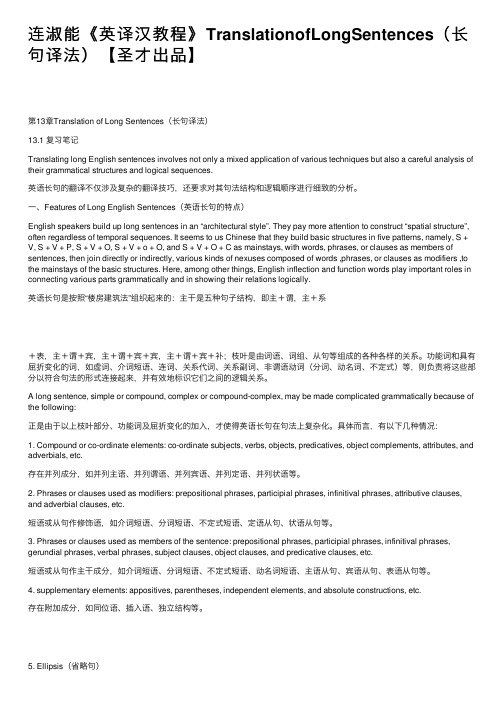
连淑能《英译汉教程》TranslationofLongSentences(长句译法)【圣才出品】第13章Translation of Long Sentences(长句译法)13.1 复习笔记Translating long English sentences involves not only a mixed application of various techniques but also a careful analysis of their grammatical structures and logical sequences.英语长句的翻译不仅涉及复杂的翻译技巧,还要求对其句法结构和逻辑顺序进⾏细致的分析。
⼀、Features of Long English Sentences(英语长句的特点)English speakers build up long sentences in an “architectural style”. They pay more attention to construct “spatial structure”, often regardless of temporal sequences. It seems to us Chinese that they build basic structures in five patterns, namely, S + V, S + V + P, S + V + O, S + V + o + O, and S + V + O + C as mainstays, with words, phrases, or clauses as members of sentences, then join directly or indirectly, various kinds of nexuses composed of words ,phrases, or clauses as modifiers ,to the mainstays of the basic structures. Here, among other things, English inflection and function words play important roles in connecting various parts grammatically and in showing their relations logically.英语长句是按照“楼房建筑法”组织起来的:主⼲是五种句⼦结构,即主+谓,主+系+表,主+谓+宾,主+谓+宾+宾,主+谓+宾+补;枝叶是由词语、词组、从句等组成的各种各样的关系。
《英汉翻译简明教程》学习辅导书(第二部分)【圣才出品】

《英汉翻译简明教程》学习辅导书(第二部分)【圣才出品】1. 实称、代称与重复(1)复习笔记★代词①英语和汉语中代词使用的区别a. 英语代词用得多,汉语代词用得少,尤其在文学作品中关于生活细节的描述时。
b. 英语有时在句子里先出代词,然后再出它所指的人或物。
汉语一般总是先出实词,然后才用代词。
例如:【英语】Ignoring the chair offered him, Chu Teh stood squarely before this youth more than ten years his junior and in a level voice told him who he was ...【汉语】朱德顾不得拉过来的椅子,端端正正地站在这个比他年轻十几岁的青年面前,用平稳的语调说明自己的身份……评析:英语中先出现了代词him,然后再出现其指代的具体人物Chu Teh,汉语中先出现的是实词“朱德”,后出现的代词“他”和“自己”。
②翻译注意事项a. 英译汉有些代词可以不译。
例如:【原文】Permit me first to thank our Chinese hosts for your extraordinary arrangements and hospitality. My wife and I, as well as our entire party, are deeply grateful.【译文】首先,请允许我对中国主人十分出色的安排和款待表示感谢。
我的夫人和我以及全体随行人员都深为感激。
评析:原文中的代词your,our都没有译。
b. 汉译英时则要在适当的地方增加代词,特别是物主代词。
例如:【原文】有一年的冬初,四叔家里要换女工,做中人的卫老婆子带她进来了,头上扎着白头绳,乌裙,蓝夹袄,月白背心,年纪大约二十六七,脸色青黄,但两颊却还是红的。
卫老婆子叫她祥林嫂,说是自己母家的邻舍,死了当家人,所以出来做工了。
王治奎《大学英汉翻译教程》【笔记课后习题及翻译示例汇总】(翻译的性质、标准及要求)【圣才出品】
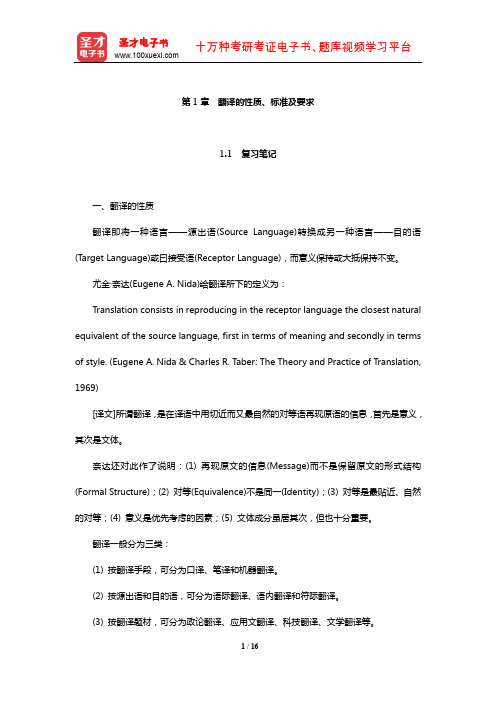
第1章翻译的性质、标准及要求1.1 复习笔记一、翻译的性质翻译即将一种语言——源出语(Source Language)转换成另一种语言——目的语(Target Language)或曰接受语(Receptor Language),而意义保持或大抵保持不变。
尤金·奈达(Eugene A. Nida)给翻译所下的定义为:Translation consists in reproducing in the receptor language the closest natural equivalent of the source language, first in terms of meaning and secondly in terms of style. (Eugene A. Nida & Charles R. Taber: The Theory and Practice of Translation, 1969)[译文]所谓翻译,是在译语中用切近而又最自然的对等语再现原语的信息,首先是意义,其次是文体。
奈达还对此作了说明:(1) 再现原文的信息(Message)而不是保留原文的形式结构(Formal Structure);(2) 对等(Equivalence)不是同一(Identity);(3) 对等是最贴近、自然的对等;(4) 意义是优先考虑的因素;(5) 文体成分虽居其次,但也十分重要。
翻译一般分为三类:(1) 按翻译手段,可分为口译、笔译和机器翻译。
(2) 按源出语和目的语,可分为语际翻译、语内翻译和符际翻译。
(3) 按翻译题材,可分为政论翻译、应用文翻译、科技翻译、文学翻译等。
二、翻译的标准翻译标准,亦曰翻译原则,即指导翻译实践、评价译文质量的尺度。
(一) 泰特勒的三原则与严复的三字标准1. 亚历山大·F·泰特勒(Alexander Fraser Tytler)在《论翻译的原则》中提出了三条基本原则:(1) A translation should give a complete transcript of the ideas of the original work.(译文应完全复写出原作的思想。
张培基《英汉翻译教程》学习辅导书( 我国翻译史简 介)【圣才出品】

第1章我国翻译史简介1.1 复习笔记一、我国翻译的早期我国的翻译事业有约两千年的历史。
最早开始的是佛经的翻译,翻译家有安世高、号称“三支”的支娄迦谶、支亮、支谦,竺法护。
二、隋唐时期我国翻译事业高度发达的时期是从隋代(公元五九〇年)起到唐代。
这一时期古代翻译界的巨星玄奘(与上述鸠摩罗什、真谛一起号称我国佛教三大翻译家)。
玄奘的贡献为:①玄奘不但把佛经由梵文译成汉文,而且把老子著作的一部分译成梵文,成为第一个把汉字著作向国外介绍的中国人。
②玄奘在翻译理论方面也是有贡献的,他提出的翻译标准是“既须求真,又须喻俗”,意即“忠实、通顺”。
三、明清时期从明代万历年间到清代“新学”时期,出现了以徐光启、林纾(琴南)、严复(又陵)等为代表的介绍西欧各国科学、文学、哲学的翻译家。
明徐光启和意大利人利玛窦合作,翻译了欧几里得的《几何原本》《测量法义》等书。
清林纾最著名的文学作品有《巴黎茶花女遗事》(La Dame aux Camelias)、《黑奴吁天录》(Uncle Tom’s Cabin)、《块肉余生述》(David Copperfield)、《王子复仇记》(Ham1et)等。
严复是我国清末新兴资产阶级的启蒙思想家,所译作品多系西方政治经济学说,如赫胥黎(T. H. Huxley)的《天演论》(Evolution and Ethics and Other Essays)、亚当·斯密(A. Smith)的《原富》(An Inquiry into the Nature and Causes of the Wealth of Nations)等。
严复提出了著名的“信、达、雅”翻译标准。
四、五四时期至今“五四”是我国近代翻译史的分水岭。
“五四”以后,我国翻译开始介绍马列主义经典著作和无产阶级文学作品。
《共产党宣言》的译文就发表在“五四”时期。
这一时期的翻译工作在内容和形式上都起了很大变化。
白话文代替了文言文。
《英汉翻译简明教程》学习辅导书(第二部分)【圣才出品】
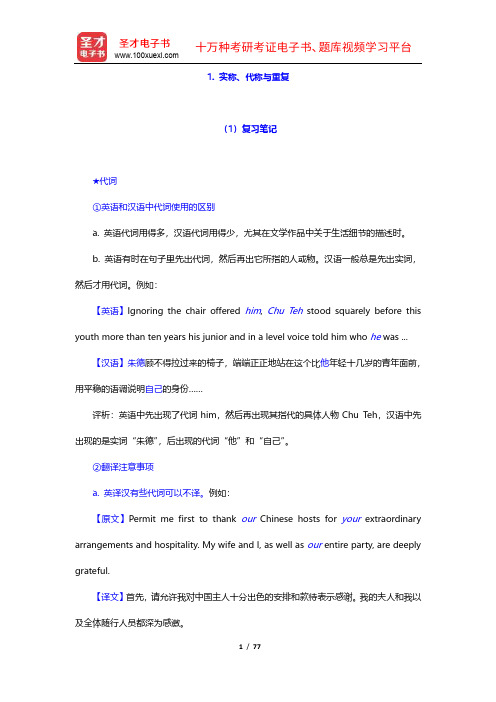
1. 实称、代称与重复(1)复习笔记★代词①英语和汉语中代词使用的区别a. 英语代词用得多,汉语代词用得少,尤其在文学作品中关于生活细节的描述时。
b. 英语有时在句子里先出代词,然后再出它所指的人或物。
汉语一般总是先出实词,然后才用代词。
例如:【英语】Ignoring the chair offered him, Chu Teh stood squarely before this youth more than ten years his junior and in a level voice told him who he was ...【汉语】朱德顾不得拉过来的椅子,端端正正地站在这个比他年轻十几岁的青年面前,用平稳的语调说明自己的身份……评析:英语中先出现了代词him,然后再出现其指代的具体人物Chu Teh,汉语中先出现的是实词“朱德”,后出现的代词“他”和“自己”。
②翻译注意事项a. 英译汉有些代词可以不译。
例如:【原文】Permit me first to thank our Chinese hosts for your extraordinary arrangements and hospitality. My wife and I, as well as our entire party, are deeply grateful.【译文】首先,请允许我对中国主人十分出色的安排和款待表示感谢。
我的夫人和我以及全体随行人员都深为感激。
评析:原文中的代词your,our都没有译。
b. 汉译英时则要在适当的地方增加代词,特别是物主代词。
例如:【原文】有一年的冬初,四叔家里要换女工,做中人的卫老婆子带她进来了,头上扎着白头绳,乌裙,蓝夹袄,月白背心,年纪大约二十六七,脸色青黄,但两颊却还是红的。
卫老婆子叫她祥林嫂,说是自己母家的邻舍,死了当家人,所以出来做工了。
四叔皱了皱眉,四婶已经知道了他的意思,是在讨厌她是一个寡妇。
郭著章、李庆生《英汉互译实用教程》(第3版)课后习题及详解-第3、4章【圣才出品】
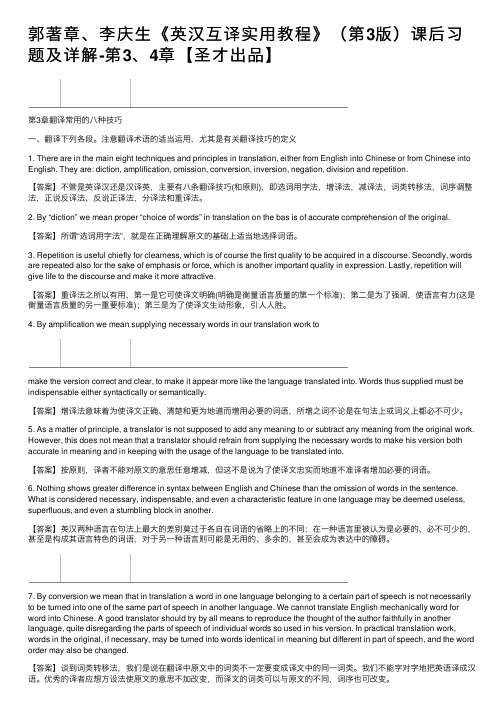
郭著章、李庆⽣《英汉互译实⽤教程》(第3版)课后习题及详解-第3、4章【圣才出品】第3章翻译常⽤的⼋种技巧⼀、翻译下列各段。
注意翻译术语的适当运⽤,尤其是有关翻译技巧的定义1. There are in the main eight techniques and principles in translation, either from English into Chinese or from Chinese into English. They are: diction, amplification, omission, conversion, inversion, negation, division and repetition.【答案】不管是英译汉还是汉译英,主要有⼋条翻译技巧(和原则),即选词⽤字法,增译法,减译法,词类转移法,词序调整法,正说反译法、反说正译法,分译法和重译法。
2. By “diction” we mean proper “choice of words” in translation on the bas is of accurate comprehension of the original.【答案】所谓“选词⽤字法”,就是在正确理解原⽂的基础上适当地选择词语。
3. Repetition is useful chiefly for clearness, which is of course the first quality to be acquired in a discourse. Secondly, words are repeated also for the sake of emphasis or force, which is another important quality in expression. Lastly, repetition will give life to the discourse and make it more attractive.【答案】重译法之所以有⽤,第⼀是它可使译⽂明确(明确是衡量语⾔质量的第⼀个标准);第⼆是为了强调,使语⾔有⼒(这是衡量语⾔质量的另⼀重要标准);第三是为了使译⽂⽣动形象,引⼈⼈胜。
张培基《英汉翻译教程》学习辅导书(英译汉常用的方法和技巧(中))【圣才出品】

第5章英译汉常用的方法和技巧(中)5.1 复习笔记一、分句、合句法分句法是指把原文的一个简单句译成两个或两个以上的句子。
合句法是指把原文两个或两个以上的简单句或一个复合句在译文中用一个单句来表达。
(一)分句法1. 把原文中的一个单词译成句子,使原文的一个句子分译成两个或两个以上的句子。
(1) 副词The Chinese seemed justifiably proud of their economic achievements.中国人似乎为他们在经济上取得的成就而自豪,这是合乎情理的。
(2) 形容词That region was the most identifiable trouble spot.那地区是个麻烦的地方,这是大家最容易看得出来的。
(3) 名词He shook his head and his eyes were wide, then narrowed in indignation.他摇了摇头,两月睁得圆圆的,接着又眯成一条线,脸上露出了愤怒的神色。
2. 把原文中一个短语译成句子,使原文的一个句子分译成两个或两个以上的句子。
(1) 分词短语She sat with her hands cupping her chin, staring at a corner of the little kitchen.她坐在那儿双手托着下巴,眼睛凝视着小厨房的一角。
(2) 名词短语Energy can neither be created nor destroyed, a universally accepted law.能量既不能被创造也不能被消灭,这是一条普遍公认的规律。
(3) 前置词短语Their power increased with their number.他们人数增加了,力量也随之增强。
3. 把原文的一个句子拆开,译成两个或两个以上的句子。
His failure to observe the safety regulations resulted in an accident to the machinery.因为他没有遵守安全规则,机器出了故障。
张培基《英汉翻译教程》学习辅导书(短文翻译及详解)【圣才出品】

附录短文翻译及详解说明:本章全面收录《英汉翻译教程》(张培基主编,修订本)中的短文翻译练习,每篇短文后面不仅有参考译文,而且还列举出相应的翻译要点及解析,对于以该书为教材的考生来说,具有极高的参考价值和较强的指导性,同时可以帮助考生巩固该书所学内容。
1When Chou En-lai’s door opened they saw a slender man of more than average height with gleaming eyes and a face so striking that it bordered on the beautiful①. Yet it was a manly face, serious and intelligent, and Chu judged him to be in his middle twenties②.Chou was a quiet and thoughtful man, even a little shy as he welcomed his visitors, urged them to be seated and to tell how he could help them.Ignoring the chair offered him, Chu Teh stood squarely before this youth more than ten years his junior and in a level voice told him who he was, what he had done in the past, how he had fled from Yunnan, talked with Sun Yat-sen, been repulsed by Chen Tu-hsiu in Shanghai, and had come to Europe to find a new way of life for himself and a new revolutionary road for China. He wanted to join the Chinese Communist Party group in Berlin, he would study and work hard, he would do anything he was asked to do but return to his old life, which had turned to ashes beneath his feet③.As he talked Chou En-lai stood facing him, his head a little to one side as was his habit, listening intently until the story was told, and then questioning him.When both visitors had told their stories, Chou smiled a little, said he would help them find rooms, and arrange for them to join the Berlin Communist group as candidates until their application had been sent to China and an answer received. When the reply came a few months later they were enrolled as full members④, but Chu’s membership was kept a secret from outsiders.General Chu explained this procedure as necessary because, as a general in the Yunnan Army, he had been one of the earliest Kuomintang members and he might be sent back to Yunnan by the Communist Party at some future date⑤. Though not publicly known as a Communist, General Chu said that he broke all connections with his past, and with the old society in every way, “so that a heavy burden seemed to fall from my shoulders.” There were hundreds of Chinese students in Germany at the time, most of them rich men’s sons with whom he might have associated⑥in the past. Such men he now avoided and he spent his time studying hungrily, avidly⑦, with young men many of whom were almost young enough to be his sons.(From The Great Road, by Agnes Smedley) 【参考译文】周恩来的房门打开时,他们看到的是一个身材瘦长、比普通人略高一点的人,两眼闪着光辉,面貌很引人注意,称得上清秀①。
《英汉翻译简明教程》学习辅导书(课文-科 普)【圣才出品】

第8单元科普(Popular Science)8.1 复习笔记翻译理论简介一、傅雷1951年,傅雷在“《高老头》重译本序”一文中写道:“以效果而论,翻译应当像临画一样,所求的不在形似而在神似。
”这是第一次有人提到翻译中“重神似不重形似”这个问题。
傅雷研究法国文学,翻译了包括巴尔扎克的《人间喜剧》和罗曼罗兰的《约翰·克利斯朵夫》等在内的三十余种作品。
为向中国读者介绍法国文学,作出了很大的贡献。
傅雷是一位勤奋、严肃、有见地的译者,他热爱文艺,认为翻译文学作品的时候,要读四到五遍,把情节、故事,记得烂熟,分析彻底,琢磨出隐藏在字里行间的微言大义,了解和体会了作品之后,再进一步把自己了解的和体会的东西忠实又动人的表达出来。
他对译文精益求精,重译了很多作品,是个很有责任感的译者。
傅雷认为“翻译重在实践”,他在中西语言对比,译者治学之道等方面也都有精辟的见解,对发展我国的翻译理论更是起了很大的作用。
他说:“谈到翻译,我觉得最难应付的倒是原文中最简单最明白而最短的句子。
这一类的句子,对原文上下文极有关系,传达不出这一点,上下文的神气全走掉了。
长句难的不在于传神,而在于重心的安排。
我们在翻译的时候,第一要精读熟读原文,把原文的意义,神韵全部抓握住了,才能放大胆子。
”他说:“即使是最优秀的译文,其韵味较之原文仍不免过或不及。
翻译时只能尽量缩短这个距离,过则求其勿太过,不及则求其勿过于不及。
……理想的译文仿佛是原作者的中文写作。
那么原文的意义与精神,译文的流畅与完整,都可以兼筹并顾,不至于再有以辞害意,或以意害辞的弊病了。
”关于“神似”,他说:“传神云云,谈何容易!年岁经验愈增,对原作体会愈增,而传神愈感不足。
领悟为一事,用中文表达为又一事。
愚对译事看法实甚简单:重神似不重形似;译文必须为纯粹之中文,无生硬拗口之病;又须能朗朗上口,求音节和谐,至节奏与tempo,当然以原作为依归。
”参考书目:1. 《翻译论集》,商务印书馆,1984年,第626页。
郭著章李庆生《英汉互译实用教程》笔记和课后习题(含考研真题)详解(文化与翻译)【圣才出品】
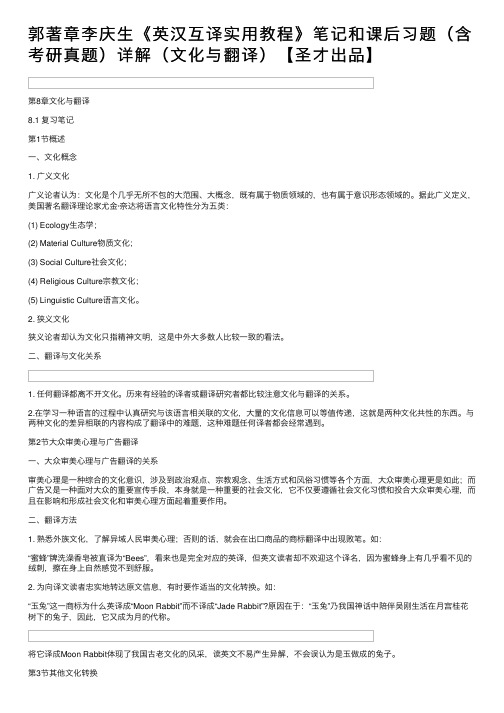
郭著章李庆⽣《英汉互译实⽤教程》笔记和课后习题(含考研真题)详解(⽂化与翻译)【圣才出品】第8章⽂化与翻译8.1 复习笔记第1节概述⼀、⽂化概念1. ⼴义⽂化⼴义论者认为:⽂化是个⼏乎⽆所不包的⼤范围、⼤概念,既有属于物质领域的,也有属于意识形态领域的。
据此⼴义定义,美国著名翻译理论家尤⾦·奈达将语⾔⽂化特性分为五类:(1) Ecology⽣态学;(2) Material Culture物质⽂化;(3) Social Culture社会⽂化;(4) Religious Culture宗教⽂化;(5) Linguistic Culture语⾔⽂化。
2. 狭义⽂化狭义论者却认为⽂化只指精神⽂明,这是中外⼤多数⼈⽐较⼀致的看法。
⼆、翻译与⽂化关系1. 任何翻译都离不开⽂化。
历来有经验的译者或翻译研究者都⽐较注意⽂化与翻译的关系。
2.在学习⼀种语⾔的过程中认真研究与该语⾔相关联的⽂化,⼤量的⽂化信息可以等值传递,这就是两种⽂化共性的东西。
与两种⽂化的差异相联的内容构成了翻译中的难题,这种难题任何译者都会经常遇到。
第2节⼤众审美⼼理与⼴告翻译⼀、⼤众审美⼼理与⼴告翻译的关系审美⼼理是⼀种综合的⽂化意识,涉及到政治观点、宗教观念、⽣活⽅式和风俗习惯等各个⽅⾯,⼤众审美⼼理更是如此;⽽⼴告⼜是⼀种⾯对⼤众的重要宣传⼿段,本⾝就是⼀种重要的社会⽂化,它不仅要遵循社会⽂化习惯和投合⼤众审美⼼理,⽽且在影响和形成社会⽂化和审美⼼理⽅⾯起着重要作⽤。
⼆、翻译⽅法1. 熟悉外族⽂化,了解异域⼈民审美⼼理;否则的话,就会在出⼝商品的商标翻译中出现败笔。
如:“蜜蜂”牌洗澡⾹皂被直译为“Bees”,看来也是完全对应的英译,但英⽂读者却不欢迎这个译名,因为蜜蜂⾝上有⼏乎看不见的绒刺,擦在⾝上⾃然感觉不到舒服。
2. 为向译⽂读者忠实地转达原⽂信息,有时要作适当的⽂化转换。
如:“⽟兔”这⼀商标为什么英译成“Moon Rabbit”⽽不译成“Jade Rabbit”?原因在于:“⽟兔”乃我国神话中陪伴吴刚⽣活在⽉宫桂花树下的兔⼦,因此,它⼜成为⽉的代称。
《英汉翻译基础教程》配套辅导书学习指导(5-8章)【圣才出品】
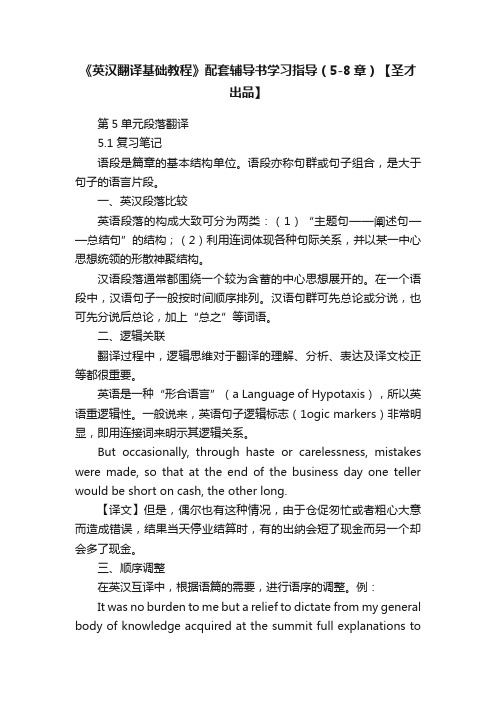
《英汉翻译基础教程》配套辅导书学习指导(5-8章)【圣才出品】第5单元段落翻译5.1 复习笔记语段是篇章的基本结构单位。
语段亦称句群或句子组合,是大于句子的语言片段。
一、英汉段落比较英语段落的构成大致可分为两类:(1)“主题句——阐述句——总结句”的结构;(2)利用连词体现各种句际关系,并以某一中心思想统领的形散神聚结构。
汉语段落通常都围绕一个较为含蓄的中心思想展开的。
在一个语段中,汉语句子一般按时间顺序排列。
汉语句群可先总论或分说,也可先分说后总论,加上“总之”等词语。
二、逻辑关联翻译过程中,逻辑思维对于翻译的理解、分析、表达及译文校正等都很重要。
英语是一种“形合语言”(a Language of Hypotaxis),所以英语重逻辑性。
一般说来,英语句子逻辑标志(1ogic markers)非常明显,即用连接词来明示其逻辑关系。
But occasionally, through haste or carelessness, mistakes were made, so that at the end of the business day one teller would be short on cash, the other long.【译文】但是,偶尔也有这种情况,由于仓促匆忙或者粗心大意而造成错误,结果当天停业结算时,有的出纳会短了现金而另一个却会多了现金。
三、顺序调整在英汉互译中,根据语篇的需要,进行语序的调整。
例:It was no burden to me but a relief to dictate from my general body of knowledge acquired at the summit full explanations toone I know so well.【译文】根据我在峰会所获得的全部知识来对我所深知的人作全面说明,这并不是一种负担,而是使我如释重负。
郭著章《英汉互译实用教程》(第4版)-翻译练笔材料及详解【圣才出品】
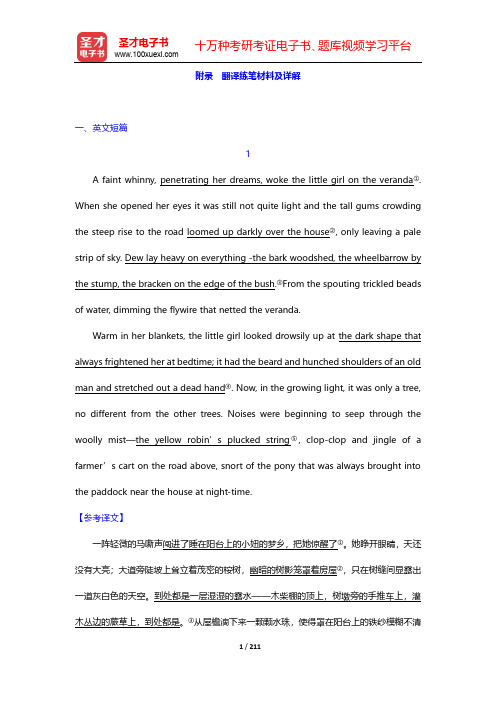
附录翻译练笔材料及详解一、英文短篇1A faint whinny, penetrating her dreams, woke the little girl on the veranda①. When she opened her eyes it was still not quite light and the tall gums crowding the steep rise to the road loomed up darkly over the house②, only leaving a pale strip of sky. Dew lay heavy on everything -the bark woodshed, the wheelbarrow by the stump, the bracken on the edge of the bush.③From the spouting trickled beads of water, dimming the flywire that netted the veranda.Warm in her blankets, the little girl looked drowsily up at the dark shape that always frightened her at bedtime; it had the beard and hunched shoulders of an old man and stretched out a dead hand④. Now, in the growing light, it was only a tree, no different from the other trees. Noises were beginning to seep through the woolly mist—the yellow robin’s plucked string⑤, clop-clop and jingle of a farmer’s cart on the road above, snort of the pony that was always brought into the paddock near the house at night-time.【参考译文】一阵轻微的马嘶声闯进了睡在阳台上的小妞的梦乡,把她惊醒了①。
《英汉翻译基础教程》 笔记及习题(翻译的类型)【圣才出品】

第10单元翻译的类型10.1 复习笔记按照文本类型来分,翻译可分为科技翻译、文学翻译、商务翻译、经贸翻译等;按照处理方法来分,翻译可以分为全译、编译、摘译、节译等等。
一、全文翻译(complete translation)全文翻译指译者对原文或原著的完整的翻译,不加任何删节。
全文翻译主要体现在文学作品翻译上,尤其是诗歌。
1. 操作原则全文翻译必须强调再现原作内容和形式的完整性和整体性,译者只能进行“微观调整”。
2. 适用范围全文翻译适用范围最广,任何语体、任何文体的作品都可以,尤其是政治外交场合、法律文书、严肃文学作品等。
3. 对译者要求全文翻译对译者提出的要求是:译者需要具备的翻译能力;译者不能对原作进行改动,限制译者主体性的发挥。
二、节译(selected translation)节译指一部著作或一篇文章局部地被删节了的翻译。
节译在内容的删取上相对比较多,有时候由于社会文化或经济政治的原因,译者经过对实际利益、译文可能的社会效应的权衡后选择删除。
节译的内容能保持意义的相对完整。
1. 操作原则节译遵循的原则为:针对性原则和重要性原则。
2. 适用范围节译也可适用多种文体的翻译,例如文学作品的节选翻译、社科作品的选段翻译等等。
节译的内容必须具有相当的整体性,能够独立成为思想意义相对完整的语篇。
3. 对译者要求节译对译者提出的要求是:译者需要具备的翻译能力;译者具备对原作各部分内容的分析判断能力,能够对原作整体思想进行准确无误的把握。
三、改译(rewriting)改译是译者在理解原作的基础上根据自己的理解重新书写的翻译方法,是译者的重新创作。
改译就是译者因为思想意识和诗学的限制而选择的处理原文语言文化有关问题的策略。
1. 操作原则改译遵循的原则为:改变必须以原作为基础;保证译文的整体性。
2. 适用范围改译可用于文学作品的译介,也可用于应用文体翻译,例如广告翻译。
3. 对译者要求改译对译者提出的要求是:译者需要具备对原文的理解与表达能力、文学创作能力、对作品内容重组能力等。
陈宏薇《新编汉英翻译教程》(第2版)-第1章 绪 论【圣才出品】

第1章绪论1.1 复习笔记一、翻译的性质与类型1. 翻译的意义翻译是将一种语言文化承载的意义转换到另一种语言文化中的跨语言、跨文化的交际活动。
翻译的本质是释义,是意义的转换。
翻译活动涉及诸多因素:译者(translator)、作者(author)、原文(source text)、原文读者(source-text readers)、译文(target text/translated text/target version)、译文读者(target-text readers)等。
2. 翻译的类型①就文本而言,翻译可分为文学翻译、科技翻译和应用文翻译。
②就方式而言,主要有全译、摘译和编译。
二、汉英翻译的单位翻译单位可以决定在什么层级上实现翻译的标准。
汉语和英语的语言层级均有词(word)、短语(phrase)、句子(sentence)、段落(paragraph)和篇章(text)。
对初学者来说,句子是较为理想的翻译单位。
但是汉语句子只是语义相对完整的一个单位,它与相邻句子之间必然存在语义上的关联,所以不可孤立地翻译句子而忽视句子之间的关系。
三、汉英翻译的标准1. 中国的翻译标准在中国,严复的“信、达、雅”(faithfulness, expressiveness and elegance)是影响最深、流传最广的翻译标准。
该三字标准最早出现于佛经翻译家支谦的《法句经序》中。
文学翻译家黄龙先生对严复提出的翻译标准倍加欣赏,并赋予“信、达、雅”新的内涵和生命,其标准适用于文学翻译。
另一位翻译家刘重德先生在严复的基础上,提出了“信达切”(faithfulness, expressiveness and closeness)的翻译标准。
“信”指信于原文内容(to be faithful to the content of the original);“达”指具备原文一样的表现力(to be as expressive as the original);“切”指尽可能切近原文风格(to be as close to the original style as possible)。
郭著章 李庆生《英汉互译实用教程》笔记和课后习题(含考研真题)详解-第1~3章【圣才出品】
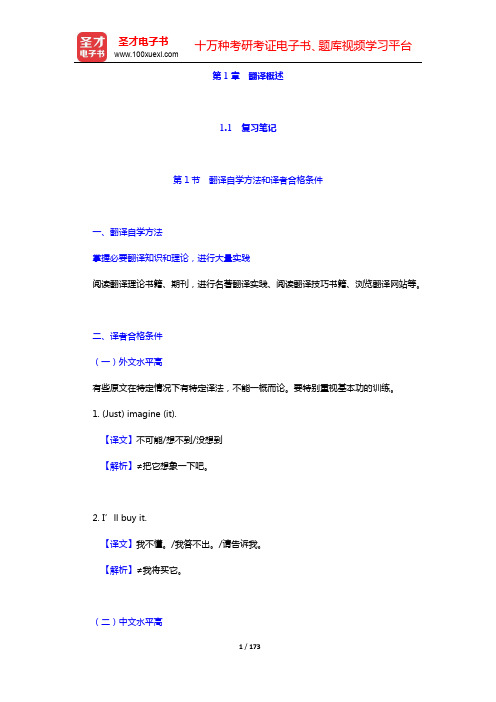
第1章翻译概述1.1 复习笔记第1节翻译自学方法和译者合格条件一、翻译自学方法掌握必要翻译知识和理论,进行大量实践阅读翻译理论书籍、期刊,进行名著翻译实践、阅读翻译技巧书籍、浏览翻译网站等。
二、译者合格条件(一)外文水平高有些原文在特定情况下有特定译法,不能一概而论。
要特别重视基本功的训练。
1. (Just) imagine (it).【译文】不可能/想不到/没想到【解析】≠把它想象一下吧。
2. I’ll buy it.【译文】我不懂。
/我答不出。
/请告诉我。
【解析】≠我将买它。
(二)中文水平高母语好是理解和表达的需要。
理解指汉译英时理解汉语原文,表达指英译汉时可用好的汉语来表达。
(三)知识面广1. John can be relied on, he eats no fish and plays the game.【译文】约翰为人可靠,他既诚实又正直。
【解析】需要英国历史典故方面的知识。
2. The Security Council has been seized of the question since then.【译文】安理会自那时以来就一直受理这个问题。
【解析】需要国际法方面的知识。
3. Nyaungu was actually the boundary between the two Japanese divisions.【译文】良字实际上是日军两个师的结合部。
【解析】需要地理、军事等方面的知识。
(四)政治觉悟高这一点在决定用词褒贬时要特别注意。
1. the peasant uprisings in the history of China【译文】中国历史上的农民起义【解析】不能根据英国的ALD及其香港出的汉译翻成“中国历史上的农民叛乱(或叛变)”,而应译为“农民起义”。
2. The enemy killed one of our comrades and we killed an enemy agent.【译文】敌人杀害了我们一位同志,我们宰了一个敌特。
《英汉翻译简明教程》学习辅导书(课文-经 济)【圣才出品】

第4单元经济(Economy)4.1 复习笔记译学点滴一、用知识武装自己对于涉及不少的人物、机构和历史事件的原文,译者若一无所知,便不能很好地理解,也就难以很好地翻译了。
这些问题如不解决,便很难说对原文有了透彻的理解。
比如地理方面的文章,要译好,则需要一定的地理知识。
翻译经济方面的文章,所需要的知识就更广了。
近年来用得比较多的两个词,一个是“知识经济”,knowledge based economy或knowledge economy,一个是“世界贸易组织”,the World Trade Organization,简称the WTO。
译者不但要知道这两个词,还要对它们有所了解才好。
总之,翻译工作要求译者具有丰富的知识,而知识是慢慢积累起来的。
二、严谨的学风翻译工作是极其细致的文字工作。
除了在译初稿时就要尽量照顾到各项细节以外,译完初稿后还要进行修改和核对。
译初稿时,注意力往往放在每个句子上,而对句子之间的联系可能照顾不够,修改时便可多注意通篇是否联贯,语气是否通顺。
如果能把译文朗读一下,自己亲耳听一听,对修改译文也是大有好处的。
细致的核对也是非常必要的。
就连最细心的译者,在译初稿时也难免有所疏漏。
即使句子的主要部分都在,也会这里丢掉一个时间状语,那里丢掉一个地点状语,或者少一个副词或形容词,日期、数字更是容易出错。
提到一系列的国家或人名时,很容易丢掉一两个。
最好数一数原文里有几个,再数一数译文里有几个,看是否一致。
当然,即使数目一致了,也还可能把字写错了,如把“土耳其”写成“土尔其”,把“新西兰”写成“新锡兰”,等等。
这些错误一定要避免。
4.2 翻译示例汇总Lesson 7 (E-C)A Global EconomyPresident Clinton realized—as all of us must—that today’s economy is global. We live in an era in which information, goods and capital speed around the globe, every hour of every day. Whether we like it or not, all of our fortunes are tied together. We are truly interdependent.America supports international trade because we believe fundamentally that trade will enrich those nations who embrace its discipline. The great promise of trade is its potential to promote mutual prosperity—and to strengthen the bonds between sovereign nations.The U. S. and China both demonstrate the potential of trade to improve the lives of our people. You know better than I the great achievements of the Chinese economy over the past two decades. In1977, the sum total of Chinese imports and exports was less than $15 billion, putting China’s share of world trade at 0.6 percent.6 The most populous country in the world, China ranked a distant30thamong exporting nations. By 1993 China’s exports and imports totaled nearly $ 200 billion. China had become the world’s tenth largest exporter.Since 1978, when China began opening its economy to increased foreign investment and trade, aggregate output has more than doubled. The strongest growth has occurred in the coastal areas near Hong Kong and opposite Taiwan, where foreign investment and modern production methods have spurred production of both domestic and export goods. Per capita GNP has grown at an average rate of 7.6 % from 1980—1992.The numbers are interesting, but how has this affected the people of China? In the last decade, telephone connections rose more than 60%. Electrical production more than doubled to 621 million kilowatt hours. In short, China has improved the economic wellbeing of its people.The people of the United States also have experienced the benefits of world trade. Since World War Ⅱ, the U.S. has been the world’s largest economy and, in most years, the world’s largest exporter.But the importance of trade in our economy has exploded in the past three decades. In 1970, the value of two way trade was equal to just 13% of the U.S. economy. Last year, that figure, at 28%, was more than twice as high. In just the last seven years, jobs supported by U. S. exports (goods and services) have risen by 4 million, to a total of 11 million. That’s almost one out of ten American jobs. Last year U.S. trade equaled $1.8 trillion.Nor is the importance of trade likely to diminish for either China or the UnitedStates. China will continue to depend upon lucrative export markets to earn the foreign exchange it needs to develop and grow. At the same time, China’s imports will supply the much needed machinery and technology to fuel its continued development.For the United States, new commercial opportunities will grow most rapidly in the emerging markets. We estimate that three quarters of new export opportunities over the next twenty years—that’s an incredible $1.9 trillion in potential exports—will come in the emerging markets of Asia and Latin America. This means jobs for American workers and a higher standard of living for the American people.(Excerp ted from “Remarks by Ambassador Kantor at the University of InternationalBusiness and Economics”, 1995)【译文】一个全球性的经济正如每个人必须认识到的那样,克林顿总统认识到当今的经济具有全球性质。
- 1、下载文档前请自行甄别文档内容的完整性,平台不提供额外的编辑、内容补充、找答案等附加服务。
- 2、"仅部分预览"的文档,不可在线预览部分如存在完整性等问题,可反馈申请退款(可完整预览的文档不适用该条件!)。
- 3、如文档侵犯您的权益,请联系客服反馈,我们会尽快为您处理(人工客服工作时间:9:00-18:30)。
第10单元演讲(Speeches)10.1 复习笔记翻译理论选读一、A New Concept of Translatingby Eugene A. Nida and Charles R. T aberEach language has its own genius.1In the first place, it is essential to recognize that each language has its own genius. That is to say, each language possesses certain distinctive characteristics which give it a special character.尤金·奈达(Eugene A. Nida)博士是美国圣经学会翻译部主任。
他不仅在美国主持《圣经》的英译工作,还在世界各地指导许多其他语言的翻译工作。
奈达认为,过去人们在翻译过程中过于重视与原文在形式上保持一致,而他主张着重考虑读者对译文的反应,应使译文的读者和原文的读者产生同样的感受。
关于原语,就《圣经》而言,也就是希伯来语和希腊语,奈达认为它们也不过是工具,被人们用来表达《圣经》里包含的意思而已。
关于译语,奈达认为每一种语言都有自己的特点,在构词法、语序、句子结构、谚语诸方面各不相同。
各个民族的文化背景不同,对各自的语言也产生不同的影响。
译者不必因为译语缺少某种表达方式而抱怨;相反地,他应该尊重这一语言的特点,最大限度地发挥其潜力,以找出适当的表达方式。
他的结论是,要想使译文保持原作的内容,就必须在形式上有所改变。
word-building capacities, unique patterns of phrase order, techniques for linking clauses into sentences, markers of discourse,2 and special discourse types of poetry, proverbs, and song. Each language is rich in vocabulary for the areas of cultural focus, the specialties of the people, e.g., cattle (Anuaks in the Sudan), yams (Ponapeans in Micronesia), hunting and fishing (Piros in Peru), or technology(the western world). Some languages are rich in modal particles.3Others seem particularly adept in the development of figurative language, and many have very rich literary resources, both written and oral.To communicate effectively one must respect the genius of each language.Rather than bemoan the lack of some feature in a language, one must respect the features of the receptor language4and exploit the potentialities of the language to the greatest possible extent. Unfortunately, in some instances translators have actually tried to “remake” a language. For example, one missionary in Latin America insisted on trying to introduce the passive voice of the verb into a language which had no such form. Of course, this was not successful. One must simply accept the fact that there are many languages which do not have a passive voice. They merely choose to report actions only as active.Rather than force the formal structure of one language upon an- other, the effective translator is quite prepared to make any and all formal changes5 necessaryto reproduce the message in the distinctive structural forms of the receptor language.To preserve the content of the message the form must be changed.If all languages differ in form (and this is the essence of their being different languages), then quite naturally the forms must be altered if one is to preserve the content. For example, in Mark I:4,6the Greek employs a nominal construction, “baptism of repentance,” but translated literally into English the resulting phrase really does not convey the meaning of the original. The average person is simply unable to describe clearly what is the relationship between “baptism”and “repentance” .Moreover, in a high percentage of languages, terms which express events (and both “baptism”and “repentance”are events, not objects) are expressed more naturally as verbs, rather than as nouns. Even this Greek noun expression is really only a nominalization (or adaptation) of what occurs in Acts 2:38 in verbal form, namely, “repent and be baptized.”In languages which either requires that such events be expressed as verbs or normally use verb rather than noun phrases, it is not only right, but essential, that the nominal form of this Greek phrase be changed into a corresponding verbal expression.(from Eugene A. Nida and Charles R.Taber, The Theory and Practice of Translation,Ch.1)1. genius:特点2. markers of discourse:话语标志3. modal particles:情态小品词4. receptor language:接受语,即“译语”,与“原语”(source language)相对。
5. formal changes相当于changes in form,意思是“形式的改变”6. Mark I:4:《马可福音》第一章第四节二、Guard Against Chinglishby Sol AdlerNow come to the more specific topics.To begin with what is still the most important and difficult problem, namely Chinglish.1Of course it would be best to think in English, try to formulate the thought as though it were being writ- ten in English (but even that rule is not universal). This is quite a problem because it’s often not a question of grammar or of obviously incorrect usage, it’s usually something more subtle. It’s often a question of collocation2. There are no simple rules, Chinese and English have different uses of verbs, nouns, adjectives and pro- nouns, different uses with regard to duplication,3 emphasis and so on.There’s also the question of word and clause order. Chinese and English are very similar in being quite flexible in their order ... sometimes the order coincides,4 which is very convenient, but often it doesn’t coincide and then there are more problems.And there are other examples of Chinglish, of Chinese usages which you don’t have in English. Chinese often uses a strong adverb with a strong verb. Here you need emphasis in Chinese, but in English it results in over-emphasis and has the opposite effect. One common example in the past which has largely been eliminated is ‘completely smash’, though ‘smash’ means to break completely. So it’s using completely twice. But even here there are exceptions. Sometimes, especially in a speech, you might say ‘to smash to smithereens’. So, to repeat myself, I try to avoid formulating universal rules. There are always exceptions. I want to warn you in advance.There is another problem we have which is an example of Chinglish. You use spatial and temporal adverbs, and spatial and temporal adverbial phrases, more frequently than we do in English, especially where the context makes it clear. In English it’s just clumsy. For instance, we struggled in earlier volumes with ‘in the world’, ‘in this world’ and ‘in our country’. In general I think in volume V it’s been smoother in this respect. Or take ‘at this time’ which may be merely an indication of tense in Chinese. I think I’ve got one example of ‘in our country’being superfluous5in English. At one stage ‘Considerable progress has been made in the last few years by the various nationalities, democratic classes, democratic parties and people’s organizations in our country’. Well, it couldn’t possibly be anywhere else. So ‘in our country’ was just deleted.(选自《翻译通讯》)1. Chinglish:中文式的英文(取Chinese与English二词的首尾拼合成的新词,带有谐谑意味,尚未被收入辞典。
